Lexus NX vs Mitsubishi Eclipse Cross – Differences & prices compared
Both models have their strengths – but which one suits you more?
Compare performance, efficiency, price and space directly: Lexus NX or Mitsubishi Eclipse Cross?
Costs and Efficiency:
When it comes to price and running costs, the biggest differences usually appear. This is often where you see which car fits your budget better in the long run.
Mitsubishi Eclipse Cross has a evident advantage in terms of price – it starts at 36000 £, while the Lexus NX costs 46000 £. That’s a price difference of around 10037 £.
Fuel consumption also shows a difference: Mitsubishi Eclipse Cross manages with 2 L and is therefore convincingly more efficient than the Lexus NX with 2.90 L. The difference is about 0.90 L per 100 km.
As for range, the Lexus NX performs evident better – achieving up to 72 km, about 27 km more than the Mitsubishi Eclipse Cross.
Engine and Performance:
Under the bonnet, it becomes clear which model is tuned for sportiness and which one takes the lead when you hit the accelerator.
When it comes to engine power, the Lexus NX has a distinct edge – offering 309 HP compared to 188 HP. That’s roughly 121 HP more horsepower.
In acceleration from 0 to 100 km/h, the Lexus NX is decisively quicker – completing the sprint in 6.30 s, while the Mitsubishi Eclipse Cross takes 10.90 s. That’s about 4.60 s faster.
In terms of top speed, the Lexus NX performs a bit better – reaching 200 km/h, while the Mitsubishi Eclipse Cross tops out at 162 km/h. The difference is around 38 km/h.
Space and Everyday Use:
Cabin size, boot volume and payload all play a role in everyday practicality. Here, comfort and flexibility make the difference.
Both vehicles offer seating for 5 people.
In curb weight, Lexus NX is hardly perceptible lighter – 1805 kg compared to 1985 kg. The difference is around 180 kg.
In terms of boot space, the Lexus NX offers evident more room – 545 L compared to 359 L. That’s a difference of about 186 L.
In maximum load capacity, the Lexus NX performs evident better – up to 1436 L, which is about 328 L more than the Mitsubishi Eclipse Cross.
When it comes to payload, Lexus NX slightly takes the win – 515 kg compared to 440 kg. That’s a difference of about 75 kg.
Who comes out on top?
Overall, the Lexus NX shows itself to be leaves the rival little chance and secures the title of DriveDuel Champion.
It convinces with the more balanced overall package and proves to be the more versatile choice for everyday use.
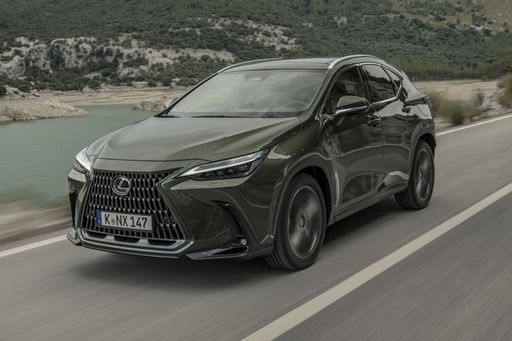
Lexus NX
Lexus NX
The Lexus NX embodies a sophisticated blend of striking design and luxurious comfort, providing an exceptional driving experience. Its hybrid powertrain offers seamless performance, ensuring both efficiency and a smooth ride. Inside, high-quality materials and innovative technology create an atmosphere of modern elegance and convenience.
details @ toyota-media.de
@ toyota-media.de
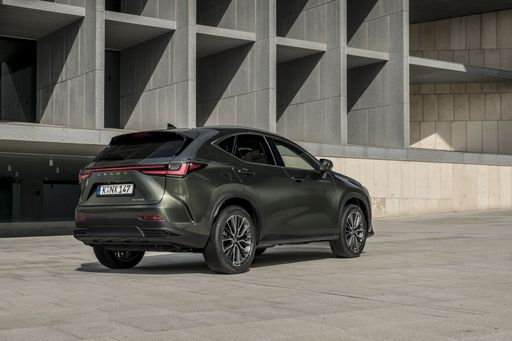 @ toyota-media.de
@ toyota-media.de
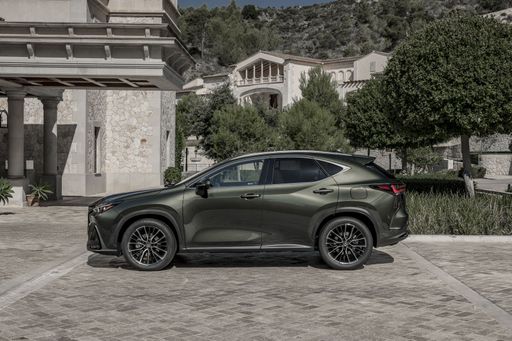 @ toyota-media.de
@ toyota-media.de
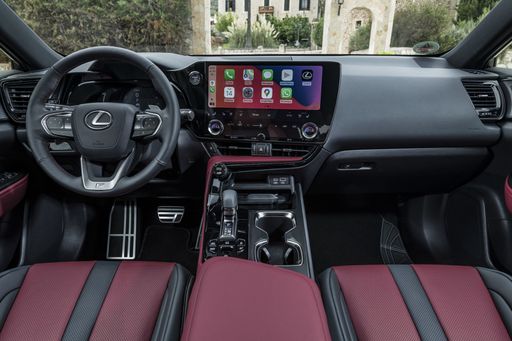 @ toyota-media.de
@ toyota-media.de
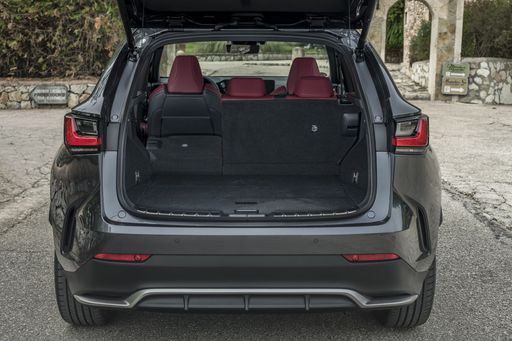 @ toyota-media.de
@ toyota-media.de
Mitsubishi Eclipse Cross
The Mitsubishi Eclipse Cross presents a sleek fusion of dynamic design and versatile functionality, perfect for urban adventures and weekend getaways alike. Its elegant lines and bold front grille make a strong statement on the road, while its well-appointed interior offers a comfortable and connected driving experience. With advanced safety features and intuitive technology, the Eclipse Cross ensures drivers feel secure and in control, whether navigating city streets or scenic routes.
details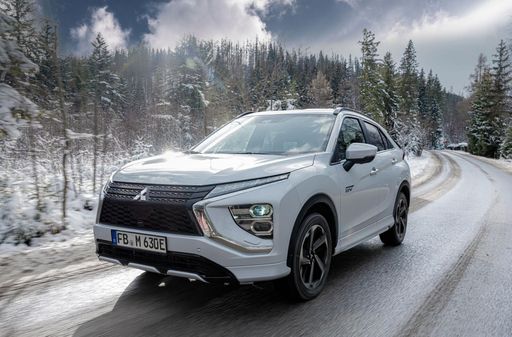 @ Mitsubishi Motos
@ Mitsubishi Motos
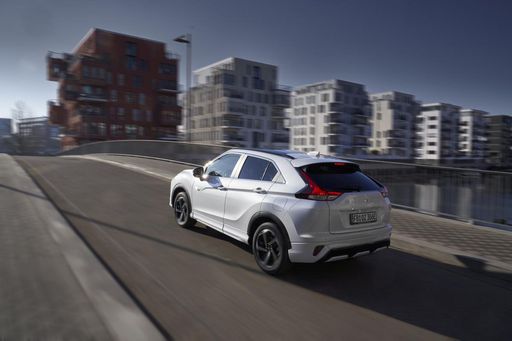 @ Mitsubishi Motos
@ Mitsubishi Motos
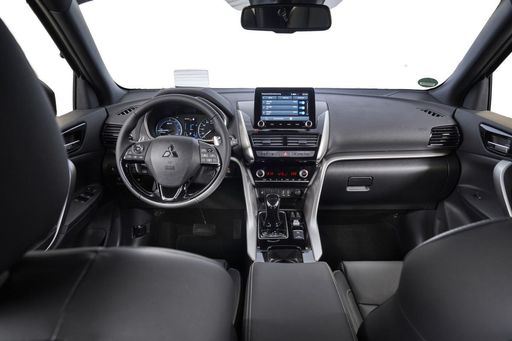 @ Mitsubishi Motos
@ Mitsubishi Motos

|

|
|
|
|
Costs and Consumption |
|
|---|---|
|
Price
46000 - 64300 £
|
Price
36000 - 42000 £
|
|
Consumption L/100km
2.9 - 5.9 L
|
Consumption L/100km
2 L
|
|
Consumption kWh/100km
-
|
Consumption kWh/100km
-
|
|
Electric Range
72 km
|
Electric Range
45 km
|
|
Battery Capacity
-
|
Battery Capacity
-
|
|
co2
65 - 134 g/km
|
co2
46 g/km
|
|
Fuel tank capacity
55 L
|
Fuel tank capacity
43 L
|
Dimensions and Body |
|
|---|---|
|
Body Type
SUV
|
Body Type
SUV
|
|
Seats
5
|
Seats
5
|
|
Doors
5
|
Doors
5
|
|
Curb weight
1805 - 2065 kg
|
Curb weight
1985 - 2052 kg
|
|
Trunk capacity
545 L
|
Trunk capacity
359 L
|
|
Length
4660 mm
|
Length
4545 mm
|
|
Width
1865 mm
|
Width
1805 mm
|
|
Height
1670 mm
|
Height
1685 mm
|
|
Max trunk capacity
1436 L
|
Max trunk capacity
1108 L
|
|
Payload
475 - 515 kg
|
Payload
373 - 440 kg
|
Engine and Performance |
|
|---|---|
|
Engine Type
Full Hybrid, Plugin Hybrid
|
Engine Type
Plugin Hybrid
|
|
Transmission
Automatic
|
Transmission
-
|
|
Transmission Detail
CVT
|
Transmission Detail
-
|
|
Drive Type
Front-Wheel Drive, All-Wheel Drive
|
Drive Type
All-Wheel Drive
|
|
Power HP
244 - 309 HP
|
Power HP
188 HP
|
|
Acceleration 0-100km/h
6.3 - 8.7 s
|
Acceleration 0-100km/h
10.90 s
|
|
Max Speed
200 km/h
|
Max Speed
162 km/h
|
|
Torque
-
|
Torque
-
|
|
Number of Cylinders
4
|
Number of Cylinders
4
|
|
Power kW
179 - 227 kW
|
Power kW
138 kW
|
|
Engine capacity
2487 cm3
|
Engine capacity
2360 cm3
|
General |
|
|---|---|
|
Model Year
2025
|
Model Year
2021 - 2022
|
|
CO2 Efficiency Class
D, B
|
CO2 Efficiency Class
B
|
|
Brand
Lexus
|
Brand
Mitsubishi
|
Is the Lexus NX offered with different drivetrains?
The Lexus NX is available as Front-Wheel Drive or All-Wheel Drive.
The prices and data displayed are estimates based on German list prices and may vary by country. This information is not legally binding.
